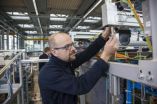(Press-News.org) The smells of summer — the sweet fragrance of newly opened flowers, the scent of freshly cut grass and the aroma of meats cooking on the backyard grill — will soon be upon us. Now, researchers are reporting that the very same beer that many people enjoy at backyard barbeques could, when used as a marinade, help reduce the formation of potentially harmful substances in grilled meats. The study appears in ACS' Journal of Agricultural and Food Chemistry.
I.M.P.L.V.O. Ferreira and colleagues explain that past studies have shown an association between consumption of grilled meats and a high incidence of colorectal cancer. Polycyclic aromatic hydrocarbons (PAHs) are substances that can form when meats are cooked at very high temperatures, like on a backyard grill. And high levels of PAHs, which are also in cigarette smoke and car exhaust, are associated with cancers in laboratory animals, although it's uncertain if that's true for people. Nevertheless, the European Union Commission Regulation has established the most suitable indicators for the occurrence and carcinogenic potency of PAHs in food and attributed maximum levels for these compounds in foods. Beer, wine or tea marinades can reduce the levels of some potential carcinogens in cooked meat, but little was known about how different beer marinades affect PAH levels, until now.
The researchers grilled samples of pork marinated for four hours in Pilsner beer, non-alcoholic Pilsner beer or a black beer ale, to well-done on a charcoal grill. Black beer had the strongest effect, reducing the levels of eight major PAHs by more than half compared with unmarinated pork. "Thus, the intake of beer marinated meat can be a suitable mitigation strategy," say the researchers.
INFORMATION:
The authors acknowledge funding from Universidade do Porto.
The American Chemical Society is a nonprofit organization chartered by the U.S. Congress. With more than 161,000 members, ACS is the world's largest scientific society and a global leader in providing access to chemistry-related research through its multiple databases, peer-reviewed journals and scientific conferences. Its main offices are in Washington, D.C., and Columbus, Ohio.
To automatically receive news releases from the American Chemical Society, contact newsroom@acs.org.
Follow us: Twitter | Facebook
Beer marinade could reduce levels of potentially harmful substances in grilled meats
2014-03-26
ELSE PRESS RELEASES FROM THIS DATE:
Research produces strong evidence for a new class of antidepressant drugs
2014-03-26
Scientists have shown for the first time that a chemical in the brain called galanin is involved in the risk of developing depression.
And the research, undertaken by a European research team, points to a strong reason to develop drugs that modify galanin functioning as a new class of antidepressant drug.
Galanin is a neuropeptide (a small protein) that was discovered and investigated over 30 years ago by various groups including the Swedish scientist Tomas Hokfelt. He is one of the senior authors of the paper published in the journal PNAS.
Professor Hokfelt and ...
First images available from NASA-JAXA global rain and snowfall satellite
2014-03-26
NASA and the Japan Aerospace Exploration Agency (JAXA) have released the first images captured by their newest Earth-observing satellite, the Global Precipitation Measurement (GPM) Core Observatory, which launched into space Feb. 27.
The images show precipitation falling inside a March 10 cyclone over the northwest Pacific Ocean, approximately 1,000 miles east of Japan. The data were collected by the GPM Core Observatory's two instruments: JAXA's Dual-frequency Precipitation Radar (DPR), which imaged a three-dimensional cross-section of the storm; and, NASA's GPM Microwave ...
The advantages of entering the workforce in a recession
2014-03-26
Despite the well-documented disadvantages of graduating from college during a recession, could graduates actually be happier with their jobs in the long run?
A new article from Administrative Science Quarterly examines whether earning a college or graduate degree in a recession or an economic boom has lasting effects on job satisfaction. Across three studies, well-educated graduates who entered the workforce during economic downturns were happier with their work than those who first searched for jobs during more prosperous times. In fact, they were happier with their ...
Immunotherapy data heralds new era of lung cancer treatment
2014-03-26
Geneva, Switzerland, 26 March 2014 -- A new era of lung cancer therapy is close to dawning, using drugs that can prevent tumour cells from evading the immune system, experts have said at the 4th European Lung Cancer Congress.
For decades, scientists and doctors thought immunotherapy –treatments that harness the immune system to fight a disease-- was of marginal benefit in lung cancer, says Jean-Charles Soria, Institute Gustave Roussy in Paris, France.
However a new class of drugs known as "immunocheckpoint regulators" have shown huge potential, Soria says. New data ...
Planning and building products and production plants simultaneously
2014-03-26
In early 2010, LANXESS decided to enter a new field of business, water purification: A production facility for Lewabrane reverse osmosis membrane filter elements was supposed to be built by the fall of 2011. Together with the company's experts, researchers from the Fraunhofer Institute for Factory Operation and Automation IFF in Magdeburg designed and had the manufacturing technology ready for production in just nine months. Afterward, they built a second, fully automatic and, therefore, more complex plant in just one year. Part of this plant – scaled down – will be on ...
Harvard scientists visualize new treatments for retinal blindness
2014-03-26
A new report published online in The FASEB Journal may lead the way toward new treatments or a cure for a common cause of blindness (proliferative retinopathies). Specifically, scientists have discovered that the body's innate immune system does more than help ward off external pathogens. It also helps remove sight-robbing abnormal blood vessels, while leaving healthy cells and tissue intact. This discovery is significant as the retina is part of the central nervous system and its cells cannot be replaced once lost. Identifying ways to leverage the innate immune system ...
Genetics can explain why infections can trigger rheumatoid arthritis
2014-03-26
A new international study has revealed how genetics could explain why different environmental exposures can trigger the onset of different forms of rheumatoid arthritis.
A team at the Arthritis Research UK Centre for Genetics and Genomics at The University of Manchester, part of a large international consortium involving scientists from across 15 academic institutions, believe their findings could have important implication for the way that rheumatoid arthritis is diagnosed and treated.
Publishing their findings in the journal American Journal of Human Genetics, they ...
New septic shock biomarker test could boost better interventions
2014-03-26
CINCINNATI – Septic shock is a severe systemic infection and major cause of death for the old and young alike. Unfortunately, researchers say testing new drug regimens to stop the infection is confounded because clinical trials include patients who are either too sick to be saved by experimental therapies or not sick enough to warrant the treatments.
In a study published in the April edition of Critical Care Medicine, researchers at Cincinnati Children's Hospital Medical Center and the University of Cincinnati report a new blood test that helps solve the dilemma by identifying ...
Eat a peach
2014-03-26
PULLMAN, Wash. - A Washington State University food scientist and colleagues at Texas A&M have found that compounds in peaches can inhibit the growth of breast cancer cells and their ability to spread.
Writing in the Journal of Nutritional Biochemistry, the researchers say the compounds could be a novel addition to therapies that reduce the risk of metastasis, the primary killer in breast and many other cancers. The compounds could be given as an extract or, judging from the doses given mice in the study, two to three peaches a day.
"I would do three peaches a day," said ...
The altruistic side of aggressive greed
2014-03-26
KNOXVILLE – In many group-living species, high-rank individuals bully their group-mates to get what they want, but their contribution is key to success in conflict with other groups, according to a study that sheds new light on the evolutionary roots of cooperation and group conflict.
In a series of mathematical models, researchers from the National Institute for Mathematical and Biological Synthesis and the University of Oxford uncovered a mechanism for explaining how between-group conflict influences within-group cooperation and how genes for this behavior might be ...


